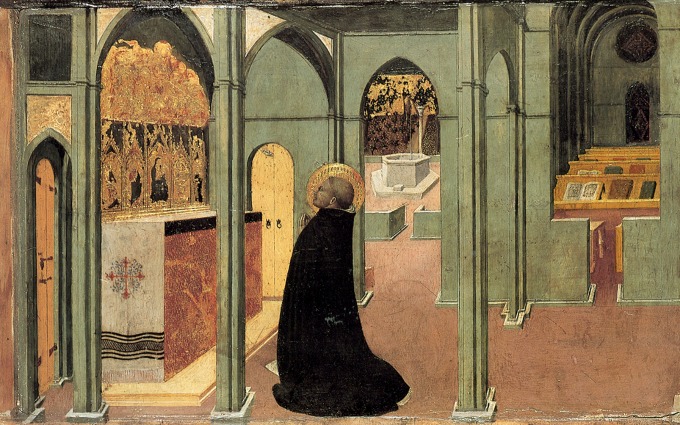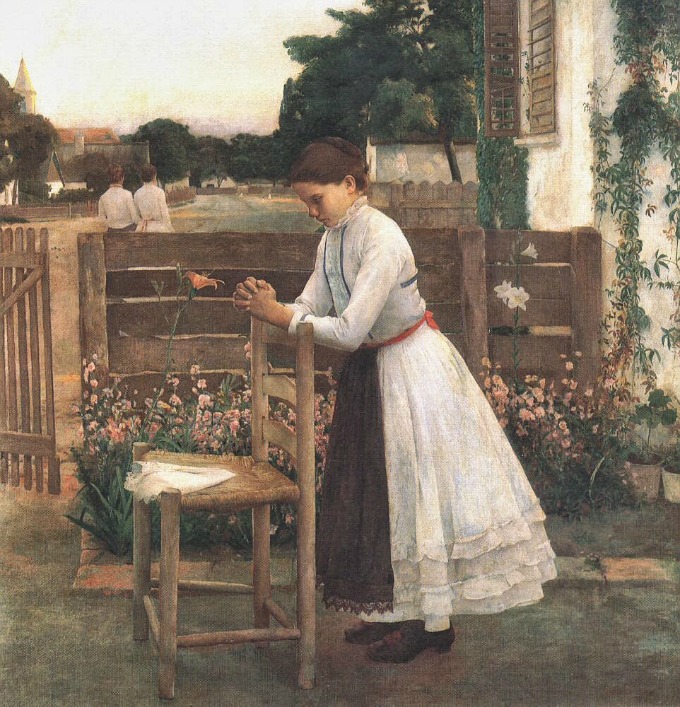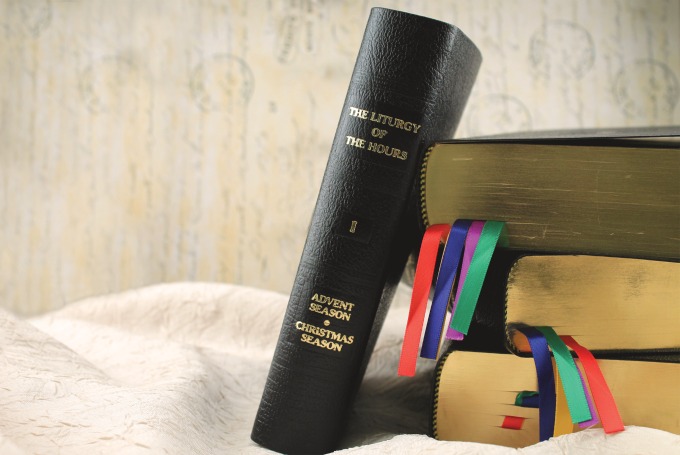Can We Really Pray Unceasingly? 5 Ways to Try
Jul 04, 2016 by Whitney Hetzel
When I used to read this verse:
"...pray without ceasing..." (1 Thessalonians 5:17)
...my mind wanted to tab it under a certain category in my brain. You probably know those categories well:
a. Not applicable (Might be meant for someone else, but not for me)
b. Not meant to be taken literally (Aka, “Yeah, right”)
c. Not meant for a modern lifestyle (Maybe it worked for another time in history, like the early days of the Church)
I first recognized this kind of categorical thinking when I heard a friend tell me about a speaker she heard at a women’s retreat. The scripture verse they were discussing was "Be perfect, therefore, as your heavenly Father is perfect.” (Matthew 5:48)
My friend told me that she was relieved upon hearing the speaker say that this verse was "not meant to be taken literally.” She went on to explain that the word perfect in Aramaic did not actually mean what it means to us in English. Instead, it meant “good, beautiful, complete.”
I guess we don’t really have to be "perfect" after all. (What a relief!)
But it is so easy to dismiss, minimize, and file away many of the hard teachings in Scripture. Should we be doing this? Are we missing something when we do? In the case of the "Be perfect as your heavenly Father is perfect," for instance: even if the speaker wasn't right, should we despair when we read such a verse, or dismiss it?
Can we be perfect on our own accord? No. But with the help of God’s grace, we should strive to be. If I filed that verse away in category b. (not to be taken literally), I would miss the opportunities to try to be the person God created me to be...to be perfect as Our Heavenly Father is perfect. After all, in Ephesians 3:20 Saint Paul tell us that God is able to exceed our grandest expectations.
Which brings me back to 1 Thessalonians 5:17: Pray unceasingly. How easy it is to say “yeah, right,” file it away, and not take it literally. On the other hand, aren’t we missing not only an opportunity, but maybe even the heart of this verse if we do?
Can we really pray unceasingly? If we understand prayer as many of the saints did—as something to constantly aspire to—then yes, I think we can.
Saint Theophan said this about continuous prayer:
I have explained to you briefly two aspects or two levels of prayer, namely: prayer which is read, when we pray to God with the prayers of others, and one's mental prayer, where we ascend mentally to God through contemplation of God, dedicating all to God, and often crying out to Him from our hearts. But this is still not all. There is a third aspect or level of prayer. The unceasing turning of the mind and heart to God, accompanied by interior warmth or burning of the spirit. This is the limit to which prayer should aspire, and the goal which every prayerful laborer should have in mind, so that he does not work uselessly in the work of prayer.
Saint Theophan goes on to say:
Do not think that we are talking about something very lofty which is an unattainable state for living people. No. It truly is a lofty state, but attainable by all. Does not everyone at some time feel warmth in their hearts in prayer, when the soul separates itself from all things and deeply enters into itself and prays hotly to God? This movement of the prayerful spirit, although it was once only temporary, must be made into a constant state, and it will reach the limits of prayer.
Okay, but really? A continuous state of prayer? There goes my computing brain again, filing away: "Category a. Maybe only applicable to a Carthusian monk living in the Grand Chartreuse in the mountains of France. But not to me, a mom of nine, living in Charlotte, NC."
Another lesser known saint, Saint Makarios of Egypt, also taught that unceasing prayer was truly attainable:
If you do not have prayer, work at prayer, and the Lord, seeing your labor, and seeing how you are patient in the labor and wholeheartedly desire this good thing, will grant you this prayer. From turning all of our works to the glory of God, we obtain a constant remembrance of God, or in other words, walking before God. Walking before God consists of doing nothing without remembering that you are in the presence of God.
We usually only think of prayer as being formal and structured. Yet Mother Teresa said that "Listening is the beginning of prayer." A quiet heart that allows the mind to think of God is, in itself, a prayer.
And again, from Saint Theophan:
We pray in the morning and the evening: there is a great distance between them. If we only turn to God at these times, then even if we pray whole-heartedly, during the day or at night, everything will fall apart, and when it is time again to pray, the soul will feel cold and empty, as before.
Back to brain computing. I'm a mother of nine, living in 2016. Can I learn to pray unceasingly? The words of the saint come back to mind: "If you do not have prayer, work on prayer..."
Here are a few ways to work on prayer throughout the day:
1. Think of God first.
In those first few moments of the day, when our brain is not fully awake, our minds can easily start to move towards worldly things, running through the list of things that need to be accomplished that day.But perhaps we can push it towards God instead. We can offer our day to Him. When I realized the power in that—the fact that my entire day, the good, the bad, the mundane—could be an offering to God, I saw that everything I do can, in some way, become a prayer.
2. Offer up short aspirations.
As we begin to move into our day, we can offer aspirations to God. These are short prayers that are easily memorized and repeated quietly throughout the day. The word "aspiration" comes from the Latin aspirare, which means "to breath upon." Here are some examples of aspirations that can be said quickly, quietly, and with assurance any time we think of it:
O Holy Spirit, sweet Guest of my soul, abide in me and grant that I may ever abide in Thee.
Jesus, I love You; Jesus, have mercy; Jesus, make Your will mine!
Jesus, I believe. Help me in my unbelief.
Eucharistic Heart of Jesus, increase in us Faith, Hope and Charity.
Immaculate Heart of Mary, pray for us who have recourse to thee.
Heart of Jesus, I put my trust in Thee!
With these short aspirations, we can heed Saint Paul's admonition to "pray without ceasing" and turn our thoughts toward God throughout the day.
3. Use the prayers you already know by heart.
There are prayers that most of us have memorized: the Our Father, the Hail Mary, and the Glory Be. These prayers are wonderful for many reasons. The Our Father is the prayer that came directly from Jesus when a disciple asked Him how to pray. We can't get any better than those words from Our Lord's lips! The Hail Mary also comes from the Scriptures. (Luke 1:26-28 and Luke 1:41-42)
The other reason these are perfect prayers to recite throughout the day is because they are common prayers that many of us have known since childhood. They roll off the tongue quickly and easily.
4. Pray as you go.
Whether driving to or from work, carting kids around, or going for a walk, we move throughout the day, and there are plenty of opportunities to pray. The rosary, the Chaplet of Divine Mercy, the Angelus, etc!
Prayer doesn't only have to be formal. We can just talk to God. He loves it when we speak to Him about our daily cares and concerns in a spontaneous manner. "The LORD is near to all them who call on him..." (Psalm 145:18)
5. End the day with prayer.
Just as we begin the day, we should end it: in conversation with Our Lord. At the end of the day, before bed, an examination of conscience helps us to think about the events of the day—the good, the bad, all of it. We can think about how we want to do better tomorrow. I remember learning that the Sign of the Cross is itself a prayer. If we are too tired for words, we can simply make the Sign of the Cross before falling asleep.
How wonderful to wake up to God, and to fall asleep thinking of Him as well!
"Seven times a day I praise you..." (Psalm 119:164)
What if you are already doing the five tips mentioned above, and are looking to take the next step, and deepen your prayer life further?
You might want to consider praying the Liturgy of the Hours. The Liturgy of the Hours (also called the Divine Office) is the way that priests and religious pray throughout out the day (seven times a day, in fact).
Each "office" is prayed at a particular time, and incorporates such things as the Psalms, readings from Scripture, and meditations written by holy men and women or the most important excerpts from Church documents. It is a rich, beautifully-structured prayer. It might take some time to learn, but is not as intimidating as it might sound!
The Second Vatican Council exhorted the Christian laity to take up the practice, and as a result, many lay people have begun reciting portions of the Liturgy of the Hours. (It's rarely practical for a lay person's daily responsibilities to be compatible with praying all the hours of the Divine Office.)
One way to have a beautiful, all-in-one daily prayer routine is to subscribe by email to The Catholic Company's Morning Offering. This email, which comes to your inbox daily, provides an inspirational quote, brief mediation, Scripture reading, and Saint or Feast of the Day—as well as access to each day's Mass readings and the Divine Office. All in one email!
Concluding thoughts...
Regardless of the attempt my brain might make at filing things away that it cannot compute, I know that to pray unceasingly is something I can strive for in this life. There are many saints who accomplished a continuous life of prayer. Let us trust God's expectations, and remember Isaiah 55:9: "...as the heavens are higher than the earth, so are my ways higher than your ways and my thoughts than your thoughts."
Are there passages from the Bible that you have struggled with?
What do you do during the day to cultivate a spirit of prayer?
Share with us in the comments below!










